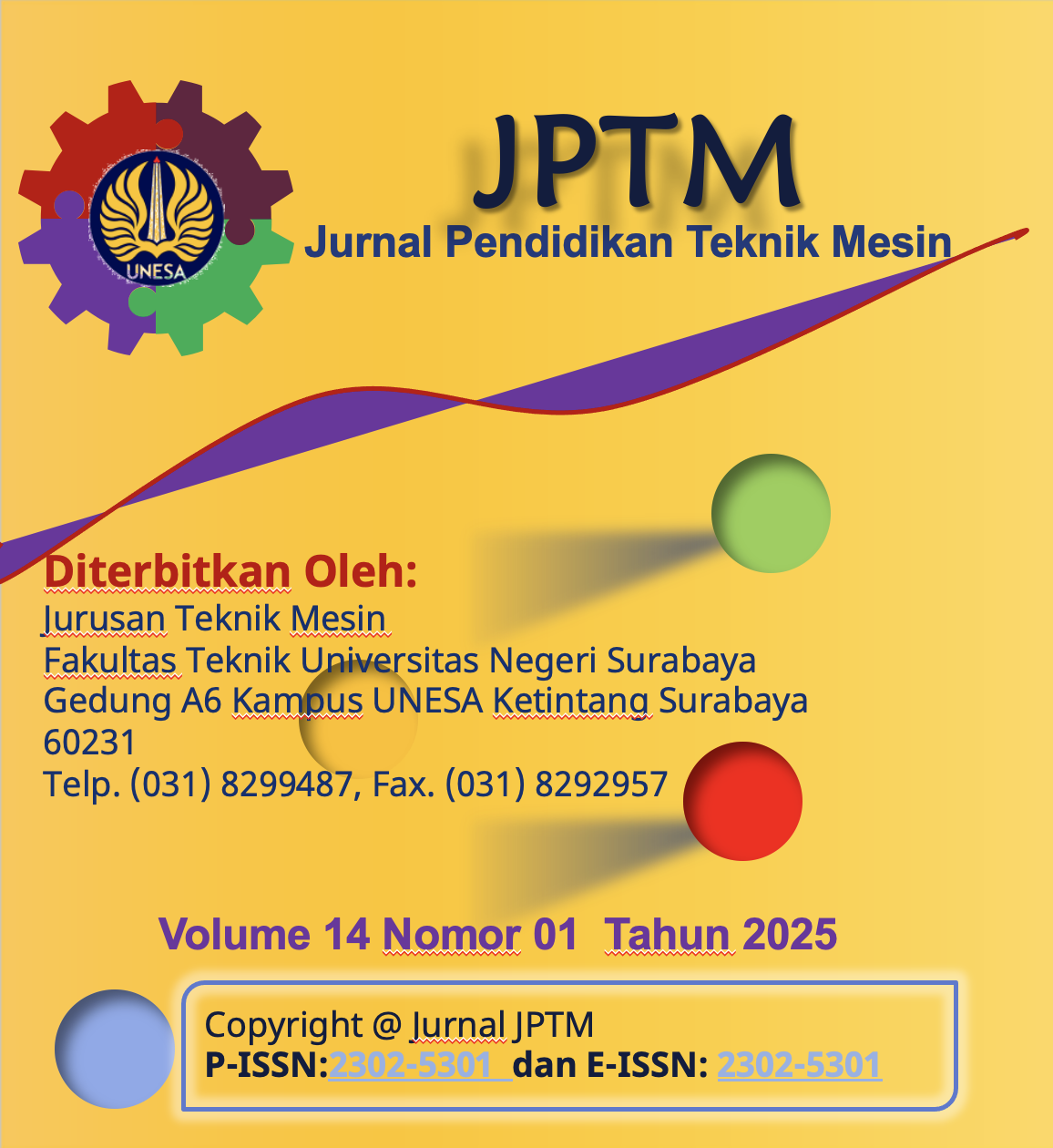IMPLEMENTATION OF THE PEER TEACHING METHOD TO IMPROVE STUDENT COMPETENCE IN LATHE MACHINING PRACTICE SUBJECTS IN GRADE XI OF SMK NEGERI 13 SURABAYA
Keywords:
peer teaching, student competence, lathe machining techniqueAbstract
The motivation behind this study was the observed lack of effectiveness of lathe machining learning at SMK Negeri 13 Surabaya, which was influenced by limited facilities and learning methods that did not fully engage students actively. This study aims to examine the implementation of the peer teaching method in improving the competence of Grade XI Mechanical Engineering students. This research was designed using a Classroom Action Research (CAR) approach and was carried out in two cycles. The research subjects were Grade XI Mechanical Engineering students. Data collection techniques included written tests to measure the knowledge aspect. The research instruments consisted of multiple-choice and essay questions. The analysis of the data was conducted using a descriptive quantitative technique to measure the improvement in students' learning outcomes from pre-test to post-test. The findings of this study indicate that the peer teaching method can be effectively applied to enhance students' competence. A resutlt after test showed an N-gain score of 0.445, categorized as moderate, with a classical mastery learning rate of 93% in the post-test.
Downloads
References
Arikunto, S. (2016). Dasar-Dasar Evaluasi Pendidikan. Jakarta: Bumi Aksara.
Djamarah, S. B., & Zain, A. (2002). Strategi Belajar Mengajar. Jakarta: Rineka Cipta.
Febianti. (2014). Peer teaching (Tutor Sebaya) Sebagai Metode Pembelajaran Untuk Melatih Peserta didik Mengajar. Edunomic, 2(2), 80-87.
Fitriyah, L. (2022). Implementasi Penilaian Autentik dalam Kurikulum Merdeka Belajar. .Jurnal Inovasi Pendidikan, 7(1), 75–85.
Hake, R. (1998). Interactive-engagement versus traditional methods: A six-thousand-student survey of mechanics test data for introductory physics courses. American Journal of Physics vol 66(1), 64–74.
Kemendikbud. (2013). Peraturan Menteri Pendidikan dan Kebudayaan Republik Indonesia Nomor 66 Tahun 2013 tentang Standar Penilaian Pendidikan. Jakarta: Kementerian Pendidikan dan Kebudayaan.
Kunandar. (2011). Langkah Mudah Penelitian Tindakan Kelas Sebagai Pengembangan Profesi Guru. Jakarta: PT. Raja Grafindo Persada.
Muhaimin. (2021). Konsep dan Aplikasi Penilaian Autentik dalam Pendidikan Vokasi. Yogyakarta: Pustaka Pelajar.
Mulyasa. (2006). Menjadi Guru Profesional Menciptakan Pembelajaran Kreatif. Bandung: Pt Remaja Rosdakarya.
Sugiyono. (2017). metode penelitian pendidikan. Bandung: Alfabeta.
Suherman. (2003 ). Strategi Pembelajaran Matematika Kontemporer. Bandung: UPI.
Sukardi. (2003). Metodologi Penelitian Pendidikan. Jakarta: PT. Bumi Aksara.
Wahyuni, S., & Suparman, M. (2021). Model Penilaian Autentik dalam Pembelajaran Tematik Terpadu di Sekolah Dasar. Jurnal Pendidikan Dasar, 8(2), 90–100.
Usman, H. d. 2006. Pengantar Statistik. Yogyakarta: Bumi Aksara
Downloads
Published
Issue
Section
 Abstract views: 78
,
Abstract views: 78
, PDF Downloads: 88
PDF Downloads: 88





